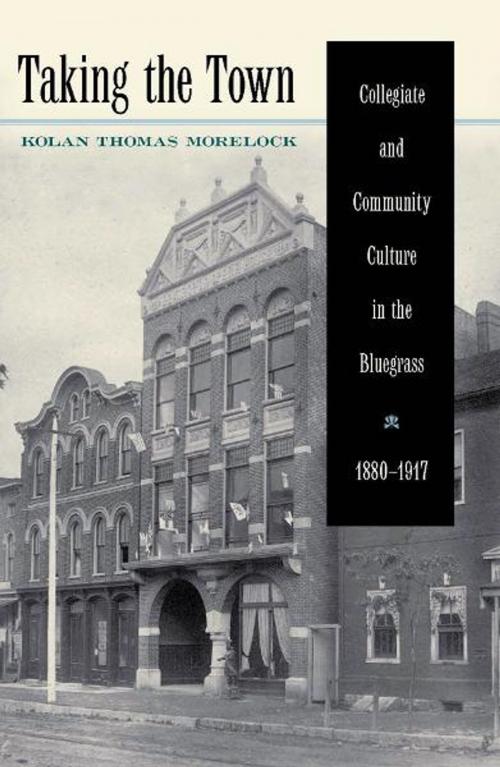Taking the Town
Collegiate and Community Culture in the Bluegrass, 1880-1917
Nonfiction, Reference & Language, Education & Teaching, History, Americas, United States| Author: | Kolan Thomas Morelock | ISBN: | 9780813138831 |
| Publisher: | The University Press of Kentucky | Publication: | June 30, 2009 |
| Imprint: | The University Press of Kentucky | Language: | English |
| Author: | Kolan Thomas Morelock |
| ISBN: | 9780813138831 |
| Publisher: | The University Press of Kentucky |
| Publication: | June 30, 2009 |
| Imprint: | The University Press of Kentucky |
| Language: | English |
The relationship between a town and its local institutions of higher education is often fraught with turmoil. The complicated tensions between the identity of a city and the character of a university can challenge both communities. Lexington, Kentucky, displays these characteristic conflicts, with two historic educational institutions within its city limits: Transylvania University, the first college west of the Allegheny Mountains, and the University of Kentucky, formerly "State College." An investigative cultural history of the town that called itself "The Athens of the West," Taking the Town: Collegiate and Community Culture in Lexington, Kentucky, 1880--1917 depicts the origins and development of this relationship at the turn of the twentieth century. Lexington's location in the upper South makes it a rich region for examination. Despite a history of turmoil and violence, Lexington's universities serve as catalysts for change. Until the publication of this book, Lexington was still characterized by academic interpretations that largely consider Southern intellectual life an oxymoron. Kolan Thomas Morelock illuminates how intellectual life flourished in Lexington from the period following Reconstruction to the nation's entry into the First World War. Drawing from local newspapers and other primary sources from around the region, Morelock offers a comprehensive look at early town-gown dynamics in a city of contradictions. He illuminates Lexington's identity by investigating the lives of some influential personalities from the era, including Margaret Preston and Joseph Tanner. Focusing on literary societies and dramatic clubs, the author inspects the impact of social and educational university organizations on the town's popular culture from the Gilded Age to the Progressive Era. Morelock's work is an enlightening analysis of the intersection between student and citizen intellectual life in the Bluegrass city during an era of profound change and progress. Taking the Town explores an overlooked aspect of Lexington's history during a time in which the city was establishing its cultural and intellectual identity.
The relationship between a town and its local institutions of higher education is often fraught with turmoil. The complicated tensions between the identity of a city and the character of a university can challenge both communities. Lexington, Kentucky, displays these characteristic conflicts, with two historic educational institutions within its city limits: Transylvania University, the first college west of the Allegheny Mountains, and the University of Kentucky, formerly "State College." An investigative cultural history of the town that called itself "The Athens of the West," Taking the Town: Collegiate and Community Culture in Lexington, Kentucky, 1880--1917 depicts the origins and development of this relationship at the turn of the twentieth century. Lexington's location in the upper South makes it a rich region for examination. Despite a history of turmoil and violence, Lexington's universities serve as catalysts for change. Until the publication of this book, Lexington was still characterized by academic interpretations that largely consider Southern intellectual life an oxymoron. Kolan Thomas Morelock illuminates how intellectual life flourished in Lexington from the period following Reconstruction to the nation's entry into the First World War. Drawing from local newspapers and other primary sources from around the region, Morelock offers a comprehensive look at early town-gown dynamics in a city of contradictions. He illuminates Lexington's identity by investigating the lives of some influential personalities from the era, including Margaret Preston and Joseph Tanner. Focusing on literary societies and dramatic clubs, the author inspects the impact of social and educational university organizations on the town's popular culture from the Gilded Age to the Progressive Era. Morelock's work is an enlightening analysis of the intersection between student and citizen intellectual life in the Bluegrass city during an era of profound change and progress. Taking the Town explores an overlooked aspect of Lexington's history during a time in which the city was establishing its cultural and intellectual identity.















